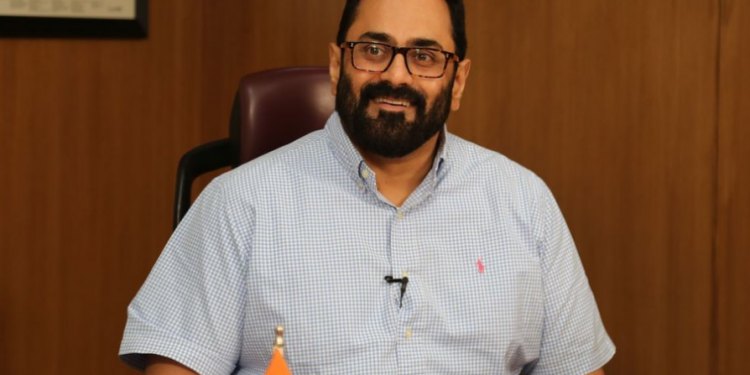New Delhi: IT Minister Rajeev Chandrasekhar Saturday said the modalities defining the structure and scope of Grievance Appellate Committees will be worked out soon, and hoped that their formation will, in fact, discourage social media platforms from continuing with their “casual” and “tokenism” approach to address user grievances.
The government on Friday tightened IT rules, paving the way for the setting up of grievance appellate panels, which will settle issues that users may have against the way social media platforms initially addressed their complaints regarding content and other matters.
The government says that the “broken” grievance redressal mechanism currently being offered by intermediaries (read social media platforms) and lakhs of messages flagging users’ concerns around unresolved complaints had forced its hand.
“Grievance Appellate Committee will be an important institution in the coming days for internet and intermediaries. We will make an announcement about its structure, constitution, scope, and terms of reference,” Chandrasekhar told reporters at a briefing.
The details will be released soon, he promised.
“It is our fond hope that intermediaries will do a better job of dealing with grievances at their level, so overflow on appellate process will be minimised,” he said asserting that the casual approach adopted by platforms, so far, in dealing with complaints, had necessitated the latest move. This, despite social media norms of 2021 mandating appointment of grievance redressal officers by social media companies to look at user complaints.
“In good faith we thought that intermediaries, by appointing grievance redressal officers, will understand that grievance redressal officers are supposed to address grievances not have tokenism there…If some people have not understood that…So we are forced to have panels,” the Minister said.
As per the amended rules, each grievance appellate committee will consist of a chairperson and two whole-time members appointed by the central government, of which one will be a member ex-officio and two shall be independent members.
“Any person aggrieved by a decision of the grievance officer may prefer an appeal to the grievance appellate committee within a period of thirty days from the date of receipt of communication from the grievance officer,” the amendment IT rules have said.
The grievance appellate panel will deal with a such appeal “expeditiously” and make an endeavour to resolve the appeal finally within thirty calendar days from the date of receipt of the appeal. If the grievance appellate committee, while dealing with the appeal, finds it necessary, it can seek assistance from any person having requisite qualification, experience and expertise in the subject matter.
The grievance appellate committee shall adopt an online dispute resolution mechanism wherein the entire appeal process, from the filing of an appeal to the decision thereof, shall be conducted through digital mode, it said.
Chandrasekhar emphasised that the new panels – 1-2 to start with – will not substitute the civil court system, and its decision can be challenged in the courts.
Asked about massive capacities that would be needed to deal with the large volumes of user complaints, the minister said the panels were in fact, a disincentive to intermediaries not to continue the “status quo, casual way of approaching grievance redresssal”.
The Government expects the move will push intermediaries to understand that accountability is an important aspect of what users seek from them, and will, in turn, prompt them to respond better.
“One scenario is that they (platforms) address through grievance redressal mechanism, they create more capacity. If they don’t, then Grievance Appellate Committee creates capacity. It is not an area Government is keen to get into, we are doing it reluctantly. We are doing it because we have an obligation and duty to `Digital Nagriks’ (digital citizens) that their grievances should be heard,” the minister said.
PTI







































